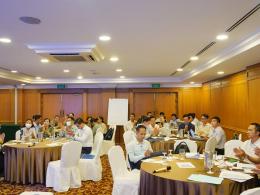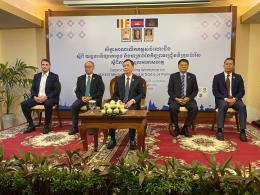More than 40% of all cultivated soils in Cambodia are moderately to severely degraded. This soil degradation is progressing at a rapid pace, mainly due to tillage-based intensive mono-cropping and usage of agro-chemical inputs. Land and soil degradation significantly reduces Cambodia’s potential to adapt to and mitigate climate change. On the other hand, climate change will further accelerate land degradation. Cambodia is experiencing increased rainfall in the wet season and prolonged drought during the dry season, which threatens food security. Strengthening the adaptation capacities of farmers will be essential to secure future agricultural yields. On the other hand, conventional agriculture emits approx. 44% of all greenhouse gas (GHG) emissions on the Asian continent.
Farmers field school conducted in Tbong Khmum province
The CCCA3-funded project on Climate-Smart Farming has introduced climate-smart and resilient farming techniques with positive effects on soil regeneration and on climate change adaptation and mitigation potential. Climate-smart practices, such as no-till farming with integrated cover crops and application of organic crop protection, increase profits for farmers, enhance the resilience of cropping systems, and reduce chemical pollution as well as greenhouse gas emissions by sequestering atmospheric CO2. As a result, both food security and safety as well as water and energy security will be increased.
The application of cover crop (Arachis repens) in a pepper farm, Kratie province
HEKS Cambodia partners with the Cambodian company SmartAgro to apply its technology in three Cambodian provinces (Tbong Khmum, Kratie, and Mondulkiri) on cashew farms, pepper farms and forage grass (pasture cropping for cattle rearing) on communal land of Indigenous people.
The project has tested the solutions on-farm and has trained farmers on demonstration plots, and during Farmer Field School learning events, including exchange learning events. In addition, the project has engaged provincial government extension workers and built a market ecosystem with retailers for cover crop seeds, and organic fertilizers to scale up the agroecological solutions and create business opportunities for the services and products by strengthening the cover crop seed business of SmartAgro company.
The project tested cover crop techniques, focusing on the management and maintenance of soil fertility for cashew and pepper plantations and the introduction of improved pasture cropping for cattle grazing. In Mondulkiri province, a total of 47 farms were selected to implement new practices starting from the 2021 rainy season. Farmers gained new knowledge through the Farmer Field School program, which was implemented on the demonstration plots in respective communities.
Since its start in October 2020, the project has reached a total of 212 farmers, involved in the implementation of the new techniques, in learning events and training workshops. Of these, 91 are women and 53 areindigenous farmers from Bunong and Cham ethnic minority groups. In addition, four video documentaries have been published to generate public interest and provide knowledge of climate-smart agriculture, cover crops, and fodder crop implementation practices.
Mrs. Tey Srey Mao, 32 years old, is a farmer with three children in Kratie. Before joining the project, she practiced conventional agriculture in her cashew nut farms, spending a lot of labor and time on managing weeds. Her family spent a lot of money on pest control and, sometimes, she felt sick after using pesticides in the farms. After participating in the project, thanks to the farmer field school and field visit activities, she has learned new practices such as cover crop.
“The educational materials and training activities provided by the project, especially the good videos on smart agriculture, have helped me to change my traditional farming concept, from traditional farming practices into climate change resilient farming techniques. I am inspired by the technology and have shared it with other female farmers in my community,” said Mao.
Ms. Run Neang is a 45-year-old farmer who lives in Mondulkiri. She has three children, and her husband is also a farmer. She has joined the project implementation since 2021, through the application of pasture, a kind of cover crop, in her cashew nut farm. She noted that the pasture can provide enough feed for her cattle while also helping to take control of weeds.
"I am delighted with the application of pasture on the farm because it can control unnecessary weeds, and I can use less pesticides than before, saving money" said Neang.
The project wrap-up workshop was conducted to share results and main achievements, including lessons learned and farmers' testimonies from the project implementation as well as feedback and recommendations for the next steps to further promote the business model and scale-up technique's adoptions of cover/fodder. The project also collected yield data from the control (5 plots) and pepper trial (5 plots) to be able to quantify the capacity to improve mitigation and resilience, in terms of reduction of GHG emissions, absorption of Carbon in the soil, water retention capacity, and nutrient cycling. Some of these activities were outsourced to the Royal University of Agriculture (RUA) as it requires to analyze data in a soil laboratory.



